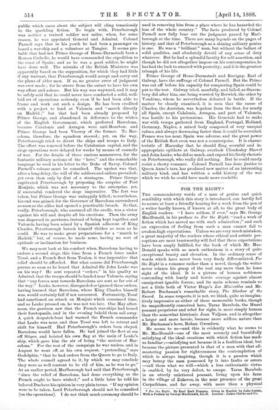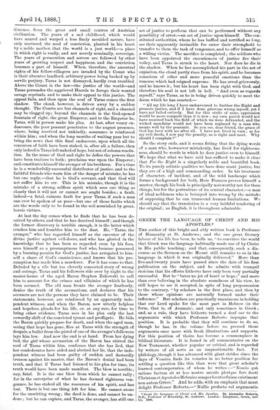FOR THE RIGHT.*
THE commendatory words of a man of genius and quick sensibility with which this story is introduced, can hardly fail to secure at least a friendly hearing for a work from the pen of a writer hardly known, if known at all, to the great body of English readers. " I have seldom, if ever," says Mr. George MacDonald, in his preface to For the Right, " read a work of fiction which has moved me with such admiration ;" and such an expression of feeling from such• a man cannot fail to awaken high expectations. Unless we are very much mistaken, a great majority of the readers whose ethical and artistic per- ceptions are most trustworthy will feel that these expectations have been amply fulfilled, for the book of which Mr. Mac- Donald speaks with so much enthusiasm is a story of quite exceptional beauty and elevation. In the ordinary sense of words which have never been very finely differentiated, For the Right is a romance rather than a novel, though the writer never relaxes his grasp of the real any more than he loses sight of the ideal. It is a picture of human nobleness contending with lonely and heroic courage against almost omnipotent ignoble forces ; and its main scheme reminds us not a little both of Victor Hugo's Les ifiserables and Mr. Robert Buchanan's remarkable story, The Shadow of the Sword. In some respects, it is not, we think, quite so imagina- tively impressive as either of these memorable books, though its magnificently conceived hero, Taras Barabola, the Huzul peasant-proprietor and rebel for right, is more simply human than the somewhat histrionic Jean Valjean, and is altogether a larger and more heroic, because more selfless, nature than Mr. Buchanan's hero, Rohan Gwenfeni.
He seems to us—and this is evidently what he seems to Mr. MacDonald—one of the most serenely and beautifully satisfying of the ideal creations with which fiction has made us familiar ;—satisfying not because it is a faultless ideal, but because the picture presented is that of a man with that all- mastering passion for righteousness the contemplation of which is always inspiring, though it is a passion which may betray the man possessed by it into faults or errors —call them what we will—which a less enthusiastic virtue is enabled, by its very defect, to escape. Tanis Barabola is an utterly unlettered peasant, living upon his farm in the village of Zulawee, in the near presence of the great Carpathians, and far away, with more than a physical • For the Right. By Karl Emil Branum. Given in English by Julie Batter. With a Perigee by George MacDonald, LL.D. London : James Clarke and Co. distance, from the great and small centres of Austrian civilisation. The years of a sad childhood, which would have soured and warped a less finely moulded nature, have only nurtured the seed of conviction, planted in his heart by a noble mother, that the world is a just world,—a place in which right is really, and not merely nominally, sovereign. The years of persecution and sorrow are followed by other years of growing respect and happiness, and the conviction becomes a part of himself. When, therefore, the ancestral rights of his fellow-villagers are invaded by the Count who is their absentee landlord, arbitrary power being backed up by servile perjury, Taras is not dismayed, hardly even troubled. Above the Count is the law—the justice of the world—and Tams persuades the aggrieved Huzuls to forego their wonted savage reprisals, and to make their appeal to this justice. The appeal fails, and then upon the soul of Taras comes the first shadow. The cloud, however, is driven away by a sudden thought. The Courts are but channels of right, and a channel may be clogged up ; beyond the channels is the God-opened fountain of right, the great Emperor, and to the Emperor he, Tams, will in person make his plea. At last, after weary en- deavours, the poor peasant penetrates to the august presence, where, being received not unkindly, assurance is reinforced within him ; and when the long months of waiting pass but to bring the news that this final endeavour, upon which all the resources of faith have been staked, is, after all, a failure, then only indeed is Tams left naked of hope, but not of solemn resolu- tion. In the name of God and right he defies the powers that have been traitors to both ; proclaims war upon the Emperor ; and constitutes himself the avenger of his brethren. For a time he is a wonderfully successful distributor of justice, and to the faithful friends who warn him of the danger of mistake, he has but one reply,—that he is God's servant, and that God will not suffer him to err. This is his mistake, though it is the mistake of a strong, selfless spirit which sees one thing so clearly that it will not or cannot see aught besides ; a fault, indeed—a fatal, ruinous fault for poor Taras, if such a man can ever be spoken of as poor—but one of those faults which are the weeds only to be found in the soil nourished by great, heroic virtues.
At last the day comes when he finds that he has been de- ceived by others, and that he has deceived himself ; and though the former discovery is terrible enough, it is the latter which crushes him and humbles him to the dust. He, " Taras, the avenger," who has regarded himself as the executor of the divine justice against evil-doers, and who has gloried in the knowledge that he has been so regarded even by his foes, sees himself as a presumptuous fool who, because possessed by a burning passion for God's justice, has arrogated to him- self a share of God's omniscience, and knows that his pre- sumption has made him a murderer. For it has come to that. Deluded by a vile but too cleverly concocted story of wrong and outrage, Taras and his followers ride over by night to the manor-house of the aged Baron Stephen Zukowski to call him to account for the crimes and villainies of which he has been accused. The old man fronts the avenger fearlessly, denies the truth of the accusations, and declares that his accusers are not the persons they have claimed to be. Their statements, however, are reinforced by an apparently inde- pendent witness, and when the Baron, now utterly helpless and hopeless, pleads for his life, or, at any rate, for time to bring other evidence, Taras sees in his plea only the last cowardly shift of the convicted tyrant and profligate. He bids the Baron quickly prepare for death, and when the aged man, seeing that hope has gone, flies at Taras with the strength of despair, a bullet from the pistol of one of the avenger's followers lays him low. And now the end is at hand. From her dying bed, the girl whose accusation of the Baron has stirred the soul of Tams within him, confesses that she has lied, that her confederates have aided and abetted her lie, that the inde- pendent witness had been guilty of sudden and dastardly treason against his master, that the Baron's denial had been truth, and that if Tams had listened to his plea for time, its truth would have been made manifest The blow is terrible ; nay, fatal. It is the one blow from which he cannot rally ; for in the enterprise of what he has deemed righteous ven- geance, he has staked all the resources of his spirit, and has lost. There is but one thing left for him. He cannot atone for the unwitting wrong ; the deed is done, and cannot be un- done; but he can expiate, and Taras, the avenger, has still one
act of justice to perform that can be performed without any possibility of error,—an act of justice upon himself. The con-
stituted authorities, whom he has baffled and terrified so long, see their apparently invincible foe enter their stronghold to transfer to them the task of vengeance, and to offer himself as
a willing victim. The sacrifice is completed ; the soldiers who have been appointed the executioners of justice fire their volley, and Tarns is struck to the heart. Nor does he die in the shadow. When he has accomplished his part in the act of expiation, the cloud partly rises from his spirit, and he becomes conscious of other and more peaceful emotions than the remorse which had reigned supreme. He has erred grievously,
and he knows it; but his heart has been right with God, and therefore his soul is not left in hell. " And even as regards myself," says Tams, as he is being driven quickly to meet the doom which he has courted,- " All my life long I have endeavoured to further the Right and promote justice, and if I have done grievous wrong myself, yet I have not failed entirely. But for this strife of mine, oppression would be more rampant than it is now ; my own parish would not have received back the field of which we were defrauded, and the wicked mandatar would not have been replaced by a man who means well by the peasants. So you see, dear friend, the grace of God has been with me after all. I have not lived in vain ; as for my evil deeds, I now pay the penalty, as is right and meet. Why should I complain P"
So the story ends, and it seems fitting that the dying words of a man who, howsoever mistakenly, has lived for righteous- ness, should be words in which he does justice even to himself. We hope that what we have said has sufficed to make it clear that For the Right is a singularly noble and beautiful book. To its purely artistic qualities we have done scant justice, but they are of a high and commanding order. In his treatment of character, of incident, and of the wild landscape which forms a background for both, Herr Franzos proves himself a master, though his book is principally noteworthy not for these things, but for the portraiture of its central character,—a man of ideal nobleness who is betrayed into wrong by the mistake of supposing that he can transcend human limitations. We should say that the translation is a very faithful rendering of the original ; as English, it is throughout admirable.



































 Previous page
Previous page